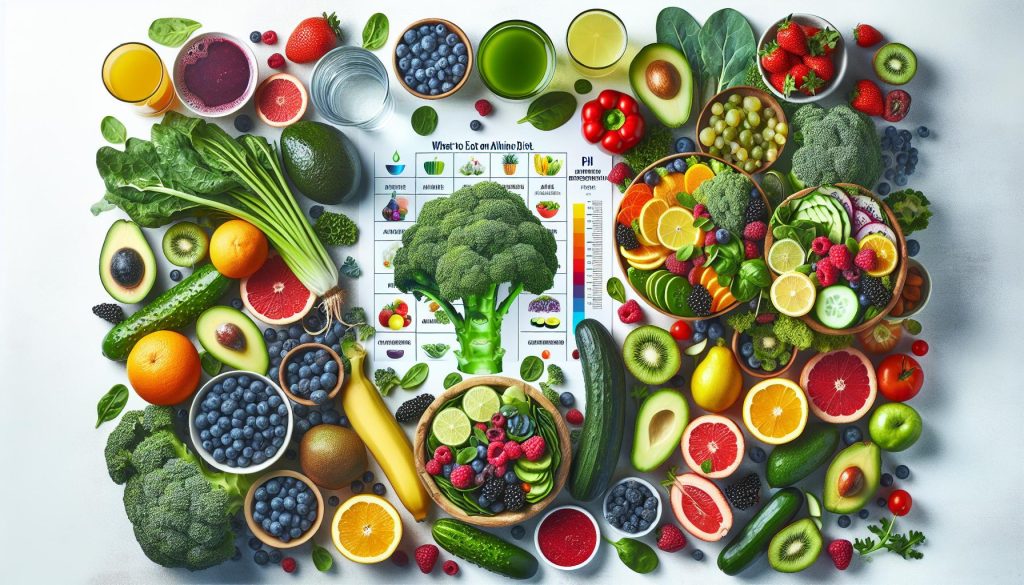
Embrace an Alkaline Way of Eating
If you’ve ever wondered, “What should I eat on an alkaline diet?”, this article is your go-to guide. An alkaline diet is an eating plan that emphasizes foods that are said to influence the body’s internal pH level towards alkalinity. Fruits, vegetables, legumes, nuts, and seeds are the stars of this diet, while animal protein and grains are generally avoided. This article aims to elaborate on these dietary guidelines and give you practical tips on effective ways to implement them. So, sit back, relax, and let’s embark on a journey of exploration through the world of alkaline eating.
Navigating the Alkaline Food Forest
The foundation of an alkaline diet is built on consuming foods that are naturally alkaline-producing. These are the foods that tip the internal scale towards alkalinity, helping to balance your body’s pH level. Take for example, fruits, vegetables, nuts, seeds, and legumes, this group of foods is like the shining star guiding you through the winding path of alkalinity. Rich in essential nutrients, these alkaline classics can help you reap a harvest of health benefits.
Focus on Fruits and Veggies
Fruit and vegetables are among the stars of the alkaline diet. They are like the North Star, leading the way towards an alkaline diet. Loaded with fiber, vitamins, minerals, antioxidants, and phytonutrients, the health benefits of these plant foods are manifold.
Steer Clear from Acidic Offenders
Just as we find allies in the alkaline food forest, there are also acidic offenders that we need to avoid. Foods like dairy, processed foods, excess animal protein, refined sugars, and grains are said to cause an acidic shift in the body. Imagine these as wolves in sheep’s clothing; while they might taste great, they are slyly tilting your pH towards acidity.
Proceed with Protein
Animal proteins are allowed in an alkaline diet, but with some caution. They should be viewed as ‘guest stars’ rather than the ‘lead characters’. Fish, for instance, can be included now and then, lending an omega-3 fatty-acid rich ‘guest appearance’ without shifting your body pH excessively toward acidity.
Pump Up on Plant Protein
Plant proteins like legumes, seeds, and nuts have a double advantage – they are alkalizing and also a good source of protein, fiber, and nutrients. So just like a trusted compass, they lead you in the right direction while also providing nourishment and satisfaction.
Pribe for a Seed and Nut Snack
Seeds and nuts offer a portable and satisfying snack that fits right in with an alkaline diet. Almonds, flaxseeds, pumpkin seeds provide protein, healthy fats, and antioxidants, making them nutrition powerhouses that pack a punch.
To Sum it All Up
Dipping your toes into the alkaline diet might seem like journeying into unknown territory, but armed with these guidelines, it doesn’t have to be daunting. By focusing on plant-based foods like fruits, vegetables, seeds, nuts and legumes, and treating animal protein like guest stars instead of leads, you can easily incorporate an alkaline way of eating into your lifestyle.
Frequently Asked Questions
1. Can I eat meat on an alkaline diet?
Yes, but in moderation. Lean proteins such as chicken and turkey are better options, but they should not make up the majority of your diet.
2. Are dairy products allowed?
Most dairy products have an acidic effect on the body, and they’re typically avoided in an alkaline diet. Opt for plant-based alternatives instead.
3. Can I drink coffee?
Coffee is considered to be acidic, so it’s best to limit its consumption. Consider trying herbal teas or green tea as an alternative.
4. What fruits are alkaline?
Most fruits are alkaline, including lemons, bananas, grapes, pineapples, watermelons, and avocados, among others.
5. Are potatoes alkaline?
Yes, potatoes are generally considered alkaline. They can be a valuable part of your alkaline diet, but remember to pair them with a variety of other fruits and vegetables.



